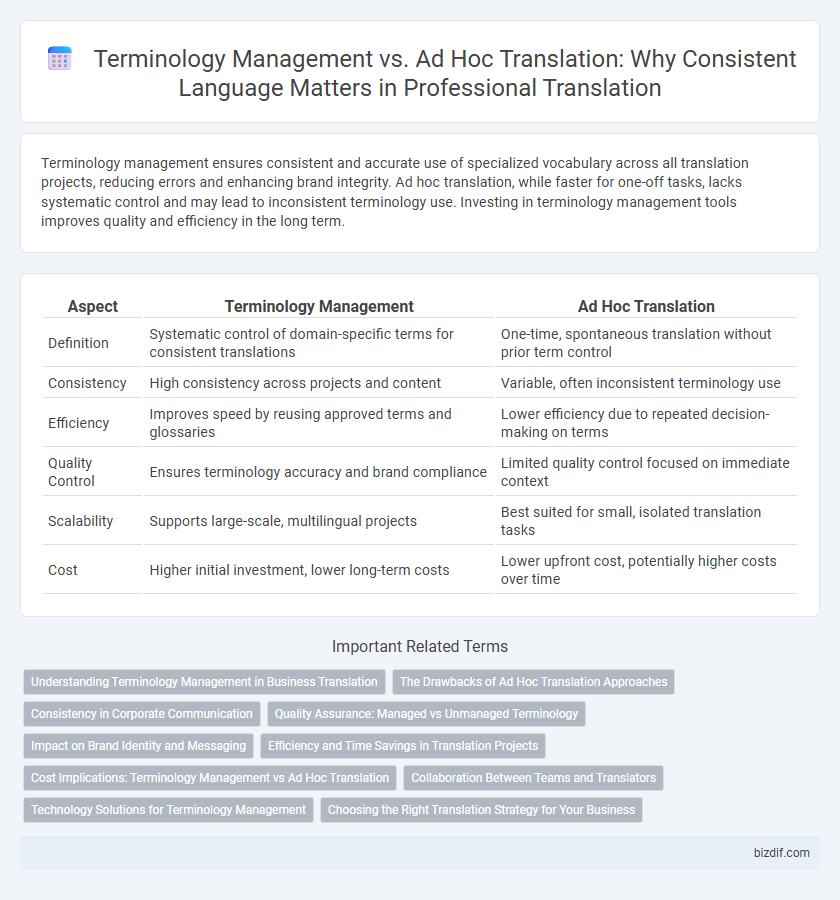Terminology management ensures consistent and accurate use of specialized vocabulary across all translation projects, reducing errors and enhancing brand integrity. Ad hoc translation, while faster for one-off tasks, lacks systematic control and may lead to inconsistent terminology use. Investing in terminology management tools improves quality and efficiency in the long term.
Table of Comparison
| Aspect | Terminology Management | Ad Hoc Translation |
|---|---|---|
| Definition | Systematic control of domain-specific terms for consistent translations | One-time, spontaneous translation without prior term control |
| Consistency | High consistency across projects and content | Variable, often inconsistent terminology use |
| Efficiency | Improves speed by reusing approved terms and glossaries | Lower efficiency due to repeated decision-making on terms |
| Quality Control | Ensures terminology accuracy and brand compliance | Limited quality control focused on immediate context |
| Scalability | Supports large-scale, multilingual projects | Best suited for small, isolated translation tasks |
| Cost | Higher initial investment, lower long-term costs | Lower upfront cost, potentially higher costs over time |
Understanding Terminology Management in Business Translation
Terminology management in business translation ensures consistent use of industry-specific terms across all documents, which enhances clarity and brand integrity. Unlike ad hoc translation, it involves creating and maintaining a centralized glossary or term base that translators reference to avoid discrepancies. Effective terminology management reduces errors, saves time, and supports precise communication in global markets.
The Drawbacks of Ad Hoc Translation Approaches
Ad hoc translation approaches often result in inconsistent terminology usage, leading to reduced clarity and potential misunderstandings across multilingual content. The lack of centralized terminology management increases the risk of errors, decreases efficiency, and complicates quality control processes. This inconsistency ultimately undermines brand integrity and user experience in global communications.
Consistency in Corporate Communication
Terminology management ensures consistent use of approved terms across all corporate communications, reducing the risk of misunderstandings and enhancing brand integrity. Ad hoc translation often leads to variability in terminology, compromising message clarity and weakening the overall corporate voice. Effective terminology management supports uniformity, improves translation quality, and strengthens corporate identity across multilingual content.
Quality Assurance: Managed vs Unmanaged Terminology
Terminology management ensures consistent and accurate use of industry-specific terms, enhancing quality assurance by reducing errors and misinterpretations in translations. In contrast, ad hoc translation lacks standardized terminology control, increasing the risk of inconsistencies and mistranslations that compromise overall content quality. Structured terminology databases and glossaries support high-quality translations by maintaining linguistic consistency across all project stages.
Impact on Brand Identity and Messaging
Terminology management ensures consistent use of brand-specific language, reinforcing a strong, recognizable brand identity across all translated content. Ad hoc translation often leads to inconsistent terminology, risking diluted brand messaging and confusion among target audiences. Maintaining precise terminology supports clear communication, preserves brand integrity, and enhances overall customer trust globally.
Efficiency and Time Savings in Translation Projects
Terminology management streamlines translation projects by maintaining consistent, reusable glossaries and databases, significantly reducing time spent on searching and verifying terms. Ad hoc translation often leads to repetitive term research and inconsistent language use, increasing overall project duration and effort. Efficient terminology management ensures faster turnaround times and higher translation quality through standardized language assets.
Cost Implications: Terminology Management vs Ad Hoc Translation
Terminology management reduces long-term translation costs by ensuring consistency and minimizing the need for repeated corrections, enabling faster project turnaround and lower revision expenses. Ad hoc translation often incurs higher costs due to inconsistent terminology, increased quality assurance efforts, and the potential for misunderstandings requiring costly rework. Investing in terminology management tools and processes leads to improved cost efficiency and better alignment with brand messaging across multilingual content.
Collaboration Between Teams and Translators
Effective terminology management fosters seamless collaboration between teams and translators by providing a centralized glossary that ensures consistency and accuracy across all translations. This structured approach reduces misunderstandings and accelerates workflow by enabling translators to access approved terms, resulting in higher quality localized content. In contrast, ad hoc translation often lacks this unified resource, causing potential inconsistencies and requiring more revisions to align terminology during post-translation collaboration.
Technology Solutions for Terminology Management
Technology solutions for terminology management streamline the consistent use of specialized vocabulary across translation projects by integrating term bases and glossaries into translation memory systems. Advanced platforms leverage AI and machine learning to automate term extraction, validation, and updates, ensuring accuracy and reducing errors in multilingual content. These tools enhance efficiency, facilitate collaboration among linguists, and support scalable terminology governance compared to the fragmented, inconsistent outcomes of ad hoc translation approaches.
Choosing the Right Translation Strategy for Your Business
Effective terminology management streamlines translation processes by ensuring consistency, accuracy, and brand voice across all content, reducing errors and improving turnaround times. Ad hoc translation suits one-off projects with limited budget or urgency but risks inconsistency and quality issues due to lack of standardized glossaries or translation memories. Businesses aiming for scalable, high-quality localization should invest in terminology management systems integrated with professional translation workflows to optimize efficiency and maintain linguistic integrity.
Terminology Management vs Ad Hoc Translation Infographic

 bizdif.com
bizdif.com